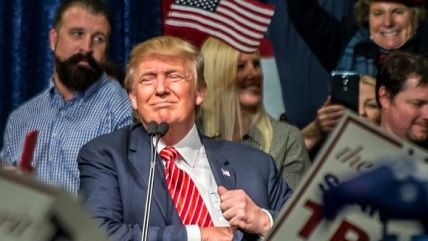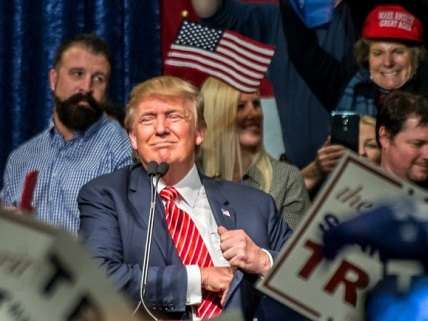Trump Takes Call From Taiwan President, Freak Out Ensues
Not quite an unprecedented break in protocol.


On Friday, President-elect Donald Trump and Taiwan President Tsai Ing-wen talked on the phone for about 10 minutes—no president or president-elect had spoken to the president of Taiwan since the U.S. withdrew its diplomatic recognition of Taiwan in 1979.
The Chinese government lodged a formal complaint about the call with the U.S. government, calling the one China policy "the political basis of the China-U.S. relationship." The White House reasserted U.S. support for the one China policy after the phone call. The policy is also something both major parties in Taiwan accept in principle although, like different U.S. administrations, they differ on their interpretation of what "one China" means for Taiwan's political independence.
Many observers insisted the phone call was unprecedented; Vanity Fair suggested it and other "flippant calls" were already creating diplomatic crises. Critics said it could "alter decades of foreign policy," The Guardian reported. Some experts did note the call could've been a "calculated move."
The last few weeks have been filled with chatter about news not comporting with the political mainstream being equivalent to Russian propaganda. Overplaying fears about the recklessness of Trump's Taiwan call would certainly look to play into Chinese propaganda about the importance of not engaging Taiwan, yet it doesn't mean such fears are a part of a propaganda network. That would be preposterous. China's China Daily insisted there was "no need to over-interpret" the Trump call, writing it off, like other state-run outlets in China, as a product of the Trump team's "inexperience." China also called the move "petty" on Taiwan's part, and reached out to Henry Kissinger to tell him they hoped for "stability."
As Foreign Policy notes, the phone call was not an unprecedented breach of protocol in U.S.-China relations—in 1980 and 1981 the incoming Reagan administration sought to renormalize relations with Taiwan, inviting senior officials to various inauguration events. When the Chinese government suggested the U.S. revisit the Taiwan Relations Act, which governs U.S. relations with Taiwan, Reagan told his envoy the act should be even tougher. "Beijing stopped pushing and the Reagan administration enjoyed a far more productive and stable U.S.-PRC relationship than his predecessors, while simultaneously deepening trust with Taiwan," Foreign Policy's Michael Green wrote, acknowledging that the Trump administration would find it "difficult to sustain this first move when there are so many other thorny issues they will have to work with Beijing."
For his part, Trump took to Twitter to defend his call, insisting the Taiwan president had called him, and pointing out that it was "interesting how the U.S. sells Taiwan billions of dollars of military equipment but I should not accept a congratulatory call." International relations professor Dan Drezner suggested on Twitter that the phone call was more important than "some guns" because it was an action that threatened "the core of the PRC's self-conception of its sovereignty." The U.S. has completed dozens of arms deals with Taiwan since the 1979.
China's response to the call was described as "measured," but while Trump team officials tried to downplay the significance of the phone call, Trump returned to Twitter to bring up other issues with China, complaining that the country did not ask for permission to "manipulate" its currency or militarize the South China Sea. Neither, though, did the U.S. ask China for permission to engage in the "Asia pivot," which Obama announced in Australia in 2011 and which sought to increase the U.S. military presence and American influence in the regions around China. For some reason, four years later, the Obama administration was still confused why the Chinese government had begun to take a more confrontational stance vis a vis the United States. It's a basic lack of understanding that undercuts the idea that the State Department officials and other foreign policy advisors necessarily have some kind of enlightened understanding of the messy business of international relations.
U.S.-China relations are bound to change to some degree under any new administration. In his election victory speech, Trump claimed under his administration the U.S. would "get along with all other nations willing to get along with us." Some normalization of U.S.-Taiwan relations could possibly be something China supports in exchange for some U.S. demilitarization in the region. It's also possible, though highly unlikely, for U.S.-China talks to produce an arrangement where the U.S. can have friendlier relations and less military obligations in the region. Trump sometimes talked about the U.S. no longer being the policeman of the world on the campaign trail. Given the anti-trade rhetoric toward China, it's hard to see that thinking taking hold in East Asia (or the rest of the world). That's unfortunate, because freer trade and less military entanglements in East Asia (and the rest of the world) would be good for peace and good for the U.S. economy, which Trump says he wants, as well as for the global economy. But until Trump takes office and goes in another direction, the possibility still exists.


Show Comments (232)